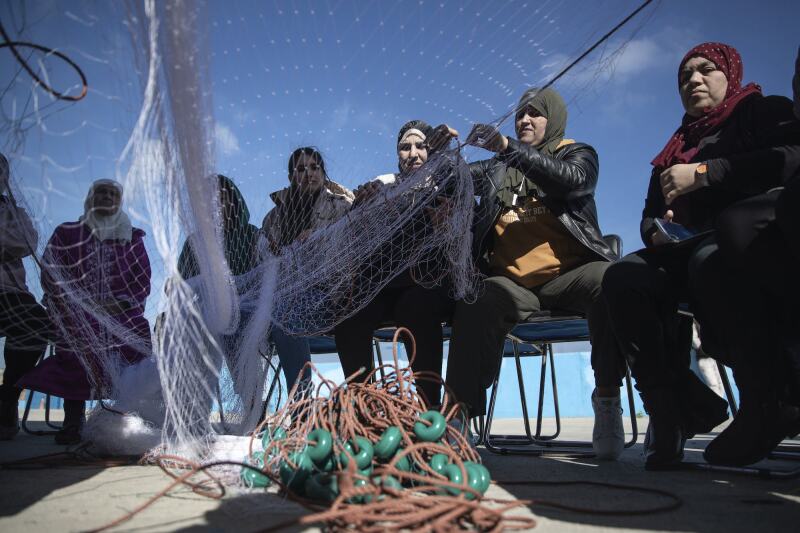Fatima Mekhnas’s boots sink into the golden sand as she surveys the last beach in Morocco’s north. Optimism glows from her eyes, a reflection of a dream fulfilled after decades of yearning for a spot on a fishing boat in the Mediterranean.
Behind her, the members of the North African country’s first female artisanal fishing cooperative push a small boat toward the sea, the start of their quest for the life-giving fish the blue waters offer.
As the boat slips into the water, the women jump in and embark on their first-ever government-recognized fishing trip. After two years of training, they have broken through the boundaries of a male-dominated livelihood.
“We live in the sea and if we separate from it, we will die like fish,” says Mekhnas, president of the Belyounech cooperative (pictured above, center). “The sea is my entire life and that of my children and the people of the village.”

Amina Mekhnas, a member of the first Moroccan female fishing cooperative, poses for a photo as she prepares to go to sea in a fishing boat.
AP Photo/Mosa’ab Elshamy
Because of Morocco’s position on the Atlantic and the Mediterranean coasts, aquaculture is central to life in many parts of the North African country. (Morocco is the continent’s leading seafood exporter, thanks to an abundance of sardines, tuna, anchovies, mackerel, and prawns in its territorial waters.)
This is especially true in coastal villages like Belyounech, which is largely cut off from the world except for a side facing the Strait of Gilbratrar that connects the Atlantic Ocean to the Mediterranean Sea. The small beach town is nestled in a natural harbor on the tip of northern Morocco. It overlooks Ceuta, a Spanish enclave located about four miles to the east, just across North Africa’s Morocco-Spain border.
In the early 2000s, the closing of the Ceuta border fence, which was enforced by Spain to stop illegal immigration and smuggling, played havoc with Belyounech’s economy—and the livelihood of its people. Village men who had worked in Ceuta were forced to fall back on their grandfathers’ tradition, pulling octopus, scorpionfish, squid, and red tuna from the waters to feed their families and sell in nearby towns.
Women returned to their kitchens.

Women in Belyounech have long mended fishing nets or helped their husbands fish, but until recently they haven’t had their own spot on a boat in the Mediterranean.
AP Photo/Mosa’ab Elshamy
“I was a house cleaner and a nanny in Ceuta. I worked for families for 20 euros a day and made a comfortable living. But when the border was closed, I just stayed home for years and years, watching the sea from my window,” said 60-year-old Khedouj Ghazil.
Then she and other women began mending nets and cleaning boats—but without pay.
“Men didn’t like the fact that a woman is at sea fishing.”
Women’s access to paying jobs in the independent fishing sector has been restricted due in part to lack of training. The sector provides 170,000 direct jobs and secures the livelihood of 5.2 million Moroccans, according to Thami Mechti, of the National Maritime Popularization Center in Laarache.
That’s changing.

The North African country’s first female fishing cooperative will, after two years of training, hope to earn money from the fish for the first time.
AP Photo/Mosa’ab Elshamy
“For two years, we’ve been giving women all the necessary training so they can fish safely and professionally and know how to keep themselves from harm’s way,” Mechti said.
Of the 19 women in the Belyounech cooperative, only 4 had previously made money from their catch.
“Men didn’t like the fact that a woman is at sea fishing,” said Fatiha Naji, who was forced to become a fisherwoman, and endure insults, after her husband lost his job as a street vendor when the border closed.
“I would often think what if other women in the village were with me,” said Naji.
The cooperative was launched in March 2018 to help the women enter the market. Initially they mended nets—but this time for money.

Members of Belyounech’s all-female artisanal fishing cooperative pushed their blue fishing boats out to sea on northern Morocco’s Mediterranean coast in February 2020.
AP Photo/Mosa’ab Elshamy
Then the women started setting their eyes on the sea.
“Working in the sea is not easy but it is what my sisters and I love. It is finally coming true,” said Mekhnas.
___
Nadine Achoui-Lesage in Belyounech contributed. AFAR assistant editor Sarah Buder contributed.
>> Next: Women to Watch in 2020











